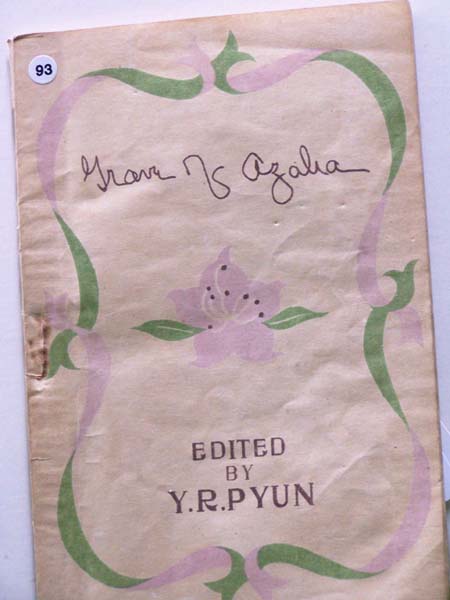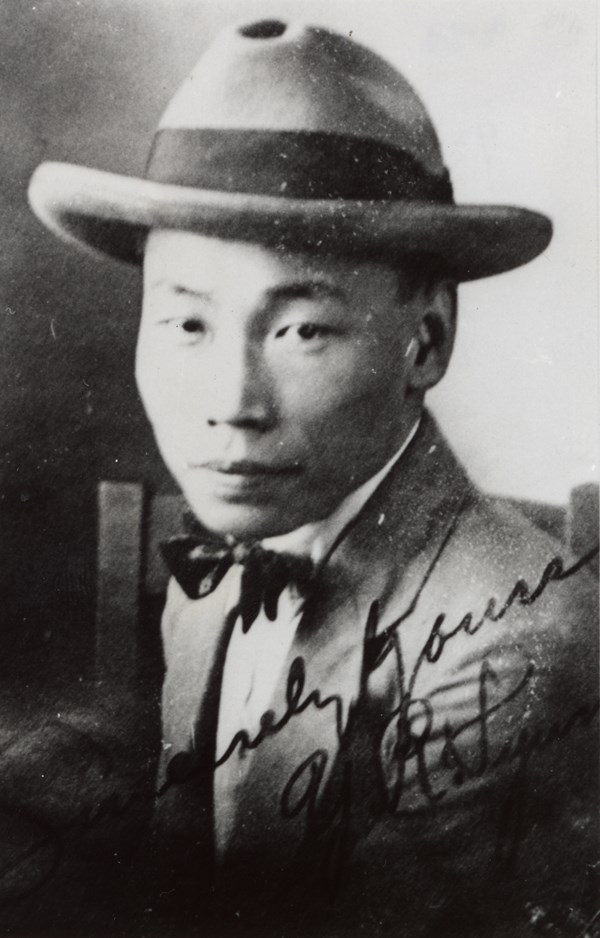
Grove of Azalea
Anthology of Modern Korean Poetry in English.
Edited by Young-ro Pyun
Published by Gukje Publications, Seoul
1947.

This anthology, containing English poems by a variety of living Korean poets, is the first ever to be published . Some poems seem to have been translated from Korean while others were originally written in English. It is an extremely rare book and has never been reprinted or put online as such..
The tone of some poems is nationalistic, perhaps reflecting the Pyuns' closeness to Syngman Rhee. The poetic English style is that of educated Koreans of the period.
Kimm Kiusic (김규식 金奎植 1881-1950) had been the vice president of the Provisional Government from 1940 until its dissolution on March 3, 1947. Like Kim Gu, he opposed the 1948 elections founding the Republic of Korea without the North's participation.
When the North withdrew from occupied Seoul later in 1950, he was forced to go with them and was reportedly killed in December. He held an M.A. in English Literature from Princeton and was professor of English in several Chinese universities.
While Y. R. Pyun had studied for a time in the United States, In Soo Lee (이인수) was the first Korean to obtain a B.A. in English Literature at the University of London (U.K.). He was shot in a South Korean prison during the war after making English-language propaganda broadcasts for the North. He had published the first translation of T. S. Eliot's "The Wasteland." His poem here might show Eliot's influence.
Younghill Kang had been living in North America since 1921, writing only in English since 1928. He was the first celebrated Korean-American writer.
Jacob Kyuang Dunn (전경무田耕武 1903-1947) moved to Hawaii as a child with his parents and lived in the US, studying and working there, active in the Korean Independence Movement. He returned to South Korea in 1945, became the vice-president of the Korean Olympic Committee and died in a plane crash in 1947.
Chang Ik-bong was also a professor of English at Sungkyunkwan University.
Col. M. Preston Goodfellow, (the subject of the first poem) was the publisher of The Brooklyn Eagle in the nineteen‐thirties and a deputy director of the Office of Strategic Services in World War II. After the Japanese surrender he was sent to Seoul, Korea, as political adviser to the United States general commanding occupation forces. When he left in May, 1946, he said that the Koreans were ready for self-government and recommended that unless the Soviet delegation returned to the joint Allied commission, the United States should go ahead with a separate government in South Korea.
I have no idea who Edna M. Florell was.
Contents
Preface: Edna M. Florell
The Korean National Anthem translated from the Korean by Pyun,Young Tai.
Including:
Poem by Kiusic Kimm (To M.P. Goodfellow, May 22,1946)
Poem by J.Kyuang Dunn (Mother Korea)
Poem by Ik Bong Chang (Eden)
Poem by In Soo Lee (Variations on the Theme of Despair before and after August 1945)
Poems by Young-tai Pyun (To the Candle; To the Goat Living in a Street Corner)
Translations of old Korean Songs
The lily, oak and sweet Pea
Freedom diverted, can man still be man?
Whene'er I Pass
To Emily Dickinson
Poems by Younghill Kang (Love gathers into a flame)
Poems by Young-ro Pyun
One Stanza Old Korean Lilts;
To Pseudo-Patriots;
Hearing into Rain;
To Phoenix;
Pilgrimage to Mt.Paik-tu;
Love's Lament
Our baby's first Birthday
Cosmos, written in 1914 -when the author was 17
The quality of the printing is sometimes poor. In the accompanying file, obvious spelling errors or missing letters have been corrected.
Young-ro Pyun (변영로 卞榮魯1889-1961) was the third son of Byeon Jeongsang (변정상 卞鼎相 1861-1935), who was appointed Minister of Foreign Affairs in 1895, in 1894 he was Minister of Negotiations and Trade. In 1896, he was appointed mayor of Goheung-gun, etc.. His oldest son was the lawyer and judge Pyun Young-man (1889-1954).
His second son was Pyun Young-tae (Byeon Yeong-tae 1892-1969), who produced the first published volume of translated Korean poetry, a roneotyped collection entitled “Songs from Korea by Y.T. Pyun”, dated 1936, which begins with 102 translated ‘old songs’ (Joseon-era sijo poems) and then continues with a substantial set of Pyun’s own poems in English.
Pyun Young-Tae served as Foreign Minister of the Republic of Korea (1951–1953) throughout most of the Korean War before becoming Prime Minister from June 28, 1954, until July 31, 1955. His poems are included in “Grove of Azalea.”
The third son, Byeon Yeong-ro (변영로 卞榮魯, 1898–1961), was a Korean poet and English literature scholar. His original name was Byeon Yeong-Bok (卞榮福), but he registered his legal name as Young-ro legally in 1958 after simply calling himself “Pyun Young-ro” for years previously He worked as a journalist for the Dong-a Ilbo newspaper. He was a well-known pioneer of modern Korean poetry.
Pyun Young-ro began studying English in 1915 when he was 17 years old. In 1923, he became a lecturer at Ewha Womans University, and in 1931, he went to the United States to study at San José State University. In 1946, he became an English professor at Sungkyunkwan University. In 1955, he was elected the first chairman of the Korean PEN Association.